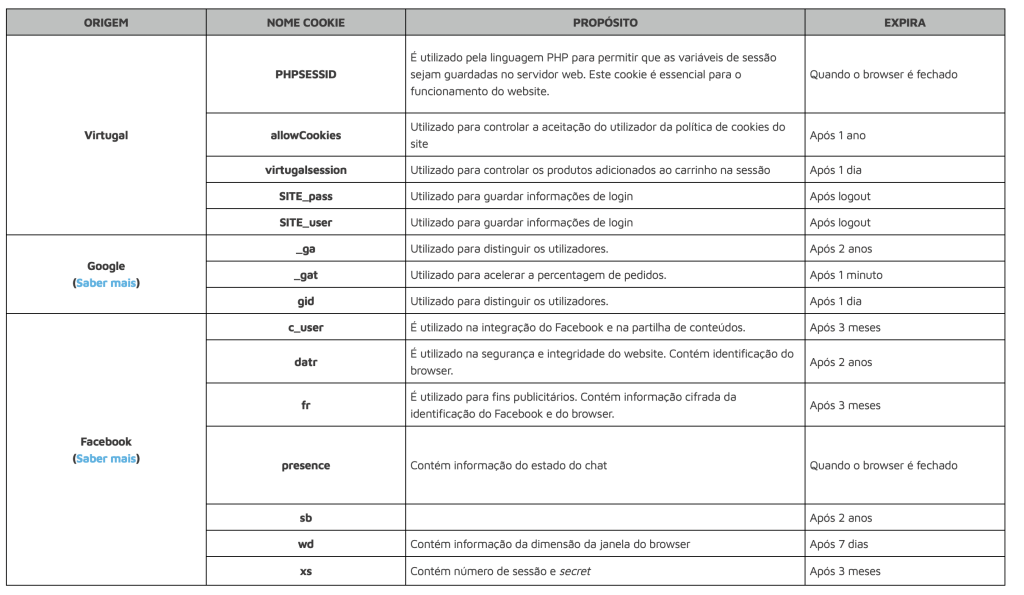Cookies Policy
1. What are cookies?
Cookies are small text files that a website, when visited by the user, places on his computer or mobile device through the internet browser. Placing cookies will help the website to recognise your device the next time you visit.
We use the term cookies in this policy to refer to all files that collect information in this way. Some cookies are essential to ensure the functionality provided, while others are intended to improve performance and user experience. You should not continue to access our website after the cookie alert if you do not agree to its use.
What kind of cookies do we use?

2. Accept/reject cookies
You may at any time choose to accept or refuse the installation of cookies on your terminal by configuring the navigation software.
2.1 If you accept cookies
Registering a cookie on your terminal depends on your wishes. At any time, you can express and modify your choice free of charge via the options provided by your navigation software.
If the browsing software you use has accepted the saving of cookies on your terminal, the cookies embedded in the pages and content that you have consulted may be temporarily stored in a specific space on your terminal. At that location, they will be readable only by the issuer of the same.
2.2 What is the point of accepting cookies?
When you visit www.virtugal.pt these cookies will record certain information that is stored on your terminal. This information is used, in particular, to propose products according to the items you have already selected during your previous visits and thus allow you to benefit from improved navigation on our Site.
3.2 How to refuse cookies
When you refuse cookies, we nevertheless install a “refuse” cookie. This cookie allows us to remember your choice so that we do not have to ask you each time you visit whether you wish to accept or decline cookies.
3.3 Configuring your browser
The configuration of the management of cookies depends on each browser and is present in the help menu of your browser.
Internet Explorer
To customise the cookie settings for a webpage
In Internet Explorer, click on the Tools button and then Internet Options.
Click the Privacy tab, and then click Sites.
In the Website Address space, enter the full address (URL) of the webpage whose privacy settings you want to customise.
For example, http://www.microsoft.com.
To allow cookies from the specified webpage to be registered on your computer, click Allow. To prohibit the registration of cookies from the specified web page on your computer, click Block.
Repeat steps 3 and 4 for each web page you want to block or allow. When finished, click OK twice.
In Safari
Go to Preferences, click on the Privacy panel and then Manage Cookies.
In Chrome
Click on the Chrome menu which is situated on the browser toolbar.
Select Settings.
Click on Show advanced settings.
In the “Privacy” section, click on the Content settings button.
In the “Cookies” section you can modify the following settings:
Delete cookies
Block cookies by default
Allow cookies by default
Make exceptions for cookies from specific websites or domains.
In Firefox
Click on the Tools button and then on Options.
Click the Privacy tab.
In History, select “Use custom settings for history.
Tick the “accept cookies” box and click on exceptions to choose the websites that will or will not be allowed to install cookies on your terminal.
In Opera
Preferences > Advanced> Cookies
Cookie preferences allow you to control how Opera manages cookies. The default setting is to accept all cookies.
Accept cookies
– All cookies are accepted (by default)
Accept cookies only from the site I visit
– Third-party cookies from a domain outside the one you are visiting will be refused
Never accept cookies
– All cookies will be rejected
4. Legal Notification Update
Virtugal reserves the right to make any changes or corrections to this cookie notification. Please check this page regularly to review the information and see if there are any updates.
This notification was updated on 15 October 2018.
